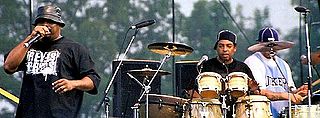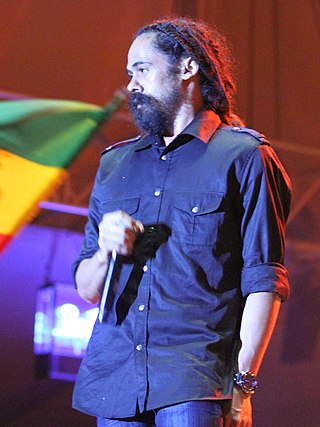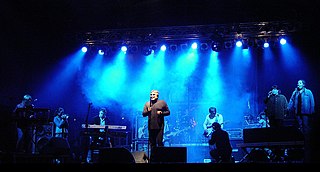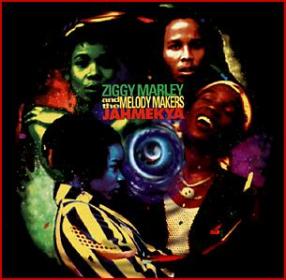Related Research Articles

Cypress Hill is an American hip hop group from South Gate, California, formed in 1988. They have sold over 20 million albums worldwide, and they have obtained multi-platinum and platinum certifications. The group has been critically acclaimed for their first five albums. They are considered to be among the main progenitors of West Coast hip hop and 1990s hip hop. All of the group members advocate for medical and recreational use of cannabis in the United States. In 2019, Cypress Hill became the first hip hop group to have a star on the Hollywood Walk of Fame.

Reggae is a music genre that originated in Jamaica in the late 1960s. The term also denotes the modern popular music of Jamaica and its diaspora. A 1968 single by Toots and the Maytals, "Do the Reggay", was the first popular song to use the word reggae, effectively naming the genre and introducing it to a global audience. While sometimes used in a broad sense to refer to most types of popular Jamaican dance music, the term reggae more properly denotes a particular music style that was strongly influenced by traditional mento as well as by American jazz and rhythm and blues, and evolved out of the earlier genres ska and rocksteady. Reggae usually relates news, social gossip, and political commentary. It is instantly recognizable from the counterpoint between the bass and drum downbeat and the offbeat rhythm section. The immediate origins of reggae were in ska and rocksteady; from the latter, reggae took over the use of the bass as a percussion instrument.

Catch a Fire is the fifth studio album by the reggae band The Wailers, released in April 1973. It was their first album released by Island Records. After finishing a UK tour with Johnny Nash, they had started laying down tracks for JAD Records when a disputed CBS contract with Danny Sims created tensions. The band did not have enough money to return to Jamaica, so their road manager Brent Clarke approached producer Chris Blackwell, who agreed to advance The Wailers money for an album. They instead used this money to pay their fares back home, where they completed the recordings that constitute Catch a Fire. The album has nine songs, two of which were written and composed by Peter Tosh; the remaining seven were by Bob Marley. While Bunny Wailer is not credited as a writer, the group's writing style was a collective process. For the immediate follow-up album, Burnin', also released in 1973, he contributed four songs. After Marley returned with the tapes to London, Blackwell reworked the tracks at Island Studios, with contributions by Muscle Shoals session musician Wayne Perkins, who played guitar on three overdubbed tracks. The album had a limited original release under the name The Wailers in a sleeve depicting a Zippo lighter, designed by graphic artists Rod Dyer and Bob Weiner; subsequent releases had an alternative cover designed by John Bonis, featuring an Esther Anderson portrait of Marley smoking a "spliff", and crediting the band as Bob Marley and the Wailers.
Steel Pulse are a roots reggae band from the Erdington area of Birmingham, England. They originally formed at Handsworth Wood Boys School, and were composed of David Hinds, Basil Gabbidon, and Ronald McQueen (bass); along with Basil's brother Colin briefly on drums and Mykaell Riley. Steel Pulse were the first non-Jamaican act to win the Grammy Award for Best Reggae Album.

Che Kuo Eruera Ness, better known by his stage name Che Fu, is a New Zealand hip hop, R&B and reggae artist, songwriter and producer. A founding member of the band Supergroove, as a solo artist he has gone on to sell thousands of albums both in New Zealand and internationally. Che Fu is considered a pioneer of Hip hop and Pasifika music in New Zealand.

Bob Marley and the Wailers were a Jamaican ska, rocksteady and reggae band. The founding members, in 1963, were Bob Marley, Peter Tosh, and Bunny Wailer.

Stephen Robert Nesta Marley is a Jamaican-American musician. The son of Bob Marley, Marley is an eight-time Grammy Award winner, three times as a solo artist, twice as a producer of younger brother Damian Marley's Halfway Tree and Welcome to Jamrock albums, and a further three times as a member of his older brother Ziggy Marley's group Ziggy Marley & The Melody Makers.
Christafari is a Christian reggae band formed in 1989. It is centered on Christ Jesus and follows the personality of ordained minister Mark Mohr, an American, and born-again Christian. Until the age of 17, Mohr was a Rastafarian.

Damian Robert Nesta "Jr. Gong" Marley is a Jamaican DJ, singer, lyricist and rapper. He is the recipient of four Grammy Awards.

Budka Suflera is a Polish rock band which was started in 1969 in Lublin by Krzysztof Cugowski. Although they disbanded soon after, Cugowski and Romuald Lipko reformed the band in 1974 and were active until 2014. The next reunion occurred in 2019.

Inner Circle, also known as The Inner Circle Band or The Bad Boys of Reggae, are a Jamaican reggae band formed in Kingston in 1968. The band first backed The Chosen Few in the early 1970s before joining with successful solo artist Jacob Miller and releasing a string of records. This era of the band ended with Miller's death in a car crash in 1980.

Robert Maksymilian Brylewski, also known as. Afa and Robin Goldroker, was a Polish musician and singer-songwriter, co-founder of bands Kryzys, Brygada Kryzys, Izrael and Armia.
Izrael was one of the most popular and influential Polish reggae bands. It was formed in March 1983 in Warsaw by two well-known Polish underground musicians: Robert Brylewski and Paweł Kelner.

Brygada Kryzys was one of the most important and influential Polish post-punk bands. The band was founded in 1981 by two well-known guitarist/vocalists from Warsaw, Robert Brylewski and Tomasz Lipiński.

5'nizza is an acoustic group formed in 2000 in Kharkiv, Ukraine that disbanded in 2007 and reunited in 2015. It is made up of friends Serhii Babkin, and Andrii "Sun" Zaporozhets.

Jahmekya is a studio album by the reggae group Ziggy Marley and the Melody Makers, released in 1991.
Władysław Daniłowski was a Polish and American pianist, composer and singer. A pioneer of jazz and tango in Poland, in the United States he is best known as a promoter of polka music. He wrote the score for the first Polish sound film.
Merenhouse, merenrap or electronic merengue,Mambo o Mambo de Calle is a style of Dominican merengue music formed by blending with dancehall reggae and hip hop. The mix of Latin music, house music and dancehall started in NYC in the late 1980s.

Marika is a Polish vocalist, songwriter and radio DJ. Currently performing avant-pop, she was previously known for her Caribbean-inspired repertoire which incorporated reggae, dancehall, as well as funk and soul music. She was hailed "the First Lady of Polish dancehall" and was noted for energetic shows and conscious lyrics. She also had a short-lived but successful career as a prime time TV host in Poland.

Piotr Cugowski is a Polish musician, vocalist of the Bracia Group, which he founded together with his brother Wojciech. He comes from a musical family, being the son of Krzysztof Cugowski, who is the founder of a well known Polish 1970's rock band Budka Suflera. Piotr Cugowski is a member of the Polish Society of the Phonographic Industry.
References
- ↑ "South by Southwest '92", Austin American-Statesman , 1992-03-12, p. 18.
- ↑ O'Neil, Caitlin. "Trad is fab, but modern rules: Warsaw Village Band and its mission to save Polish folk music – one juiced-up, tranced-out, reggae-inflected oldie at a time", Boston Globe , 2006-05-11, P. 4.
- ↑ French, Howard W. "Celebrating Bob Marley, Voice of the Dispossessed", New York Times , 1991-05-13, p. C11.
- ↑ Cooper, Carolyn. "Unconventional hero", Newsday , 2005-02-06, p. A35.
- ↑ "MTB Interview >> John Peel". www.b92.net. Archived from the original on 2002-03-13.
- ↑ youtube Sen o dolinie by K. Cugowski live music
- 1 2 Heim, Chris. "Reggae ambassadors: Bands worldwide adopt Jamaica's musical language", Chicago Tribune , 1988-12-20, p. 3.
- ↑ Stewart, Linda. "In Poland, all Canadians are long-lost relatives", The Globe and Mail , 1985-07-20, p. T5.
- ↑ Connolly, Sean. "Schuylkill dancer gets to see the life of Soviets, Poles", The Morning Call , 1987-10-08, p. N3.
- ↑ Pol'and'Rock Festival
- ↑ Pasek, Beata. "Poland's '99 Woodstock imitation of the original", Associated Press, published in San Antonio Express-News , 1999-08-08, p. A10.
- ↑ Ambrose, Robert. "A hitchhiker's guide to a world of music after dark", Anchorage Daily News , 1996-04-05, p. H23.
- ↑ Purdy, Matthew (2002-09-22). "Roll Out the Barrel... for the Traffic Report?". New York Times . p. 41.